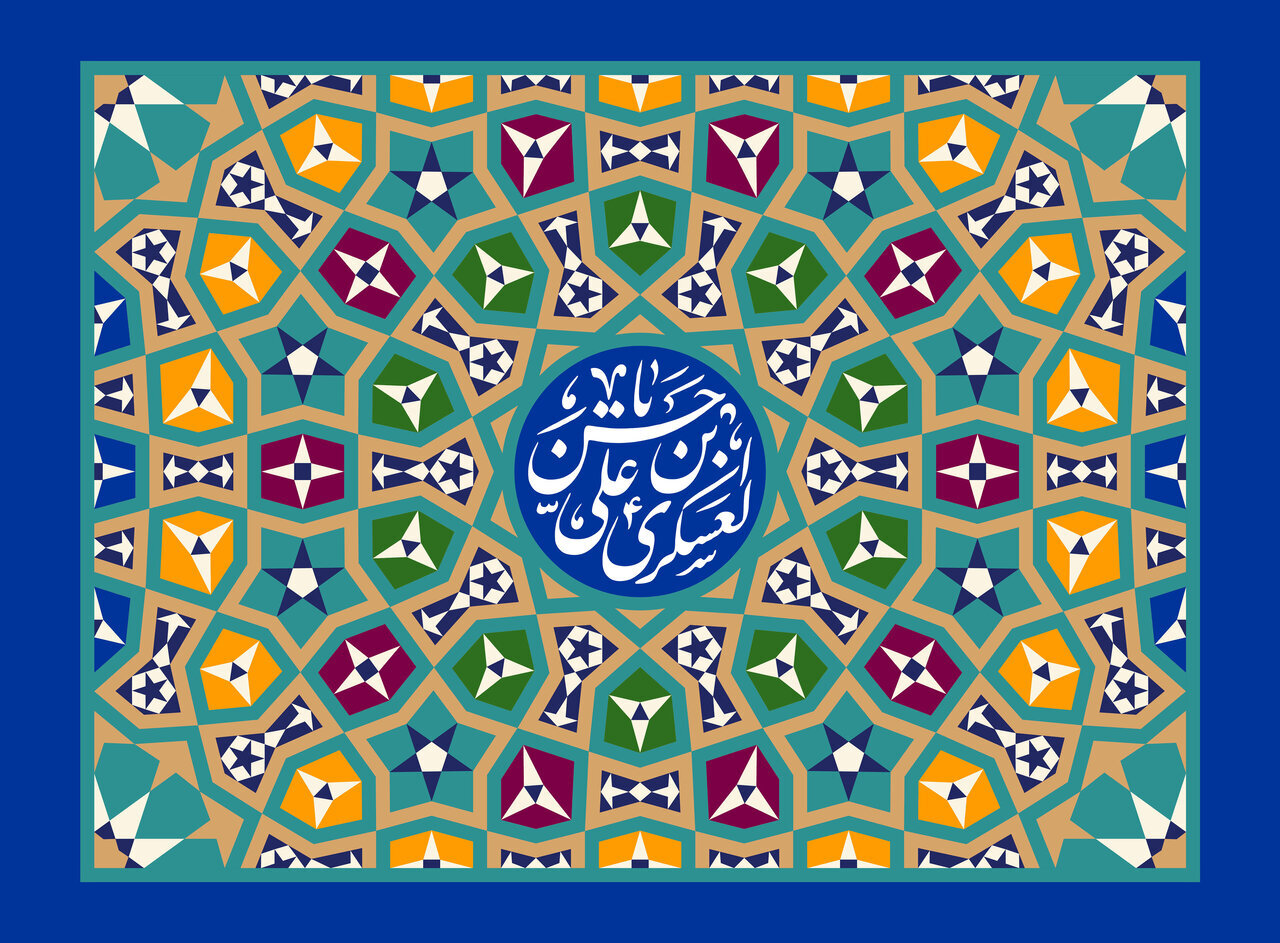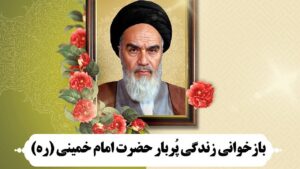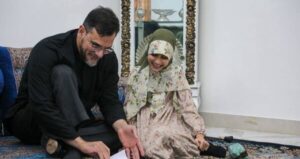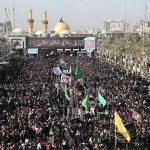The following text is a part of the life lessons of Imam Hasan Askari (AS) by Missionary thought and culture basehas been prepared and processed and is offered to those interested on the occasion of the 8th of Rabi al-Thani, the birthday of the 11th Imam.
This text introduces you to the conditions and events of the 28 years of life and 6 years of Imamate of the 11th Shiite Imam:
Imam Askari (a.s.) was born on the eighth of Rabi al-Thani in the year 232 in the city of Medina. He came to Samarra in the year 236 with his honorable father, Imam Hadi (a.s.).
These two Imams (AS) were under such surveillance that they were not even allowed to leave the city. This pressure was so great that Imam Askari (AS) did not perform even one Hajj or Umrah during his noble life. In this sense, it can be said that he was in the hardships of his enemies more than his beloved fathers.
Title of Imam Hasan Askari (AS)
Imam Hasan (a.s.) is better known by the nickname Askari, which is due to the confinement of Imam (a.s.) in the military area. But this attribute does not express a special virtue about that Prophet; Therefore, he is also called by his other titles such as Zaki, Fazel and Sadiq. Of course, the adjective “military” expresses the alienation and oppression of the warrior of the 11th Imam.
Twenty-eight years of life
The twenty-eight-year life of Imam Hassan (a.s.) was accompanied by severe restrictions, imprisonment, and the tyranny of the Abbasid caliphs. Especially during the Imamate of Imam Askari, these restrictions became more severe.

The most important zakhdads during the Imamate era
The Imamate period of Imam Askari lasted for six years, and in this short period of time, some events took place, some of which are mentioned below:
1. Preparing the Shias for the occultation
One of the important issues during the Imamate of Imam Hadi and Imam Askari (AS) is to prepare the Shia for the absence of God’s authority, Hazrat Sahib Al-Amr (AS). Of course, this absence started in a way from Imam Askari (a.s.) himself. Imam Hadi (a.s.) rarely showed his noble son in public, and many Shiites, although they were aware of the birth of Imam Askari (a.s.), did not know him.
When Muhammad 1, the noble son of Imam Hadi (a.s.) passed away, a group of Shiites went to the Imam’s (a.s.) house to bury him, and in the courtyard of the house they saw a twenty-year-old young man who came out of the house in distress and was next to Imam Hadi (a.s.). ) was placed. Many Shiites did not know that young man who was Imam Hasan Askari (AS) and asked who he was. Imam Hasan Askari (a.s.) took the same method more seriously than his son Hazrat Mahdi (a.s.).
2. The strictness of the rulers on Imam Askari (AS)
During the six years of his Imamate, Imam Askari (AS) was a contemporary with several corrupt Abbasid caliphs. The first of them is Mu’taz, the killer of Imam Hadi (AS). He also wanted to kill Imam Askari (a.s.) and ordered Saeed Hajib to take him from Samarra to Kufa and kill him on the way, but before this order was implemented, his death came and he himself was killed.
After Mu’taz, Muhtedi reached the caliphate. By pretending to be ascetic and pious, he wanted to attract the attention of others and show himself like Umar ibn Abd al-Aziz and deceive people. But he also put the Imam (a.s.) in dire straits and put him in prison to prevent the Imam (a.s.) from marrying and the birth of the promised Mahdi (a.s.). He was killed on the 15th of Rajab 256.
3. Preventing the marriage of Imam Hasan Askari (AS)
The oppressive Abbasid caliphs did not want Imam Hasan Askari (AS) to marry; Because they knew that the last proof of God, who fills the earth with justice, is his son. They had placed spies with the titles of slaves and maids in the houses of Imam Hadi and Imam Askari (a.s.) to find out about their most secret affairs and prevent the marriage of Imam Askari (a.s.). But divine providence prevailed over their will and Imam Askari (a.s.) got married during the time of his honorable father, Imam Hadi (a.s.).
After the death of Mahtadi, Motadam Abbasi succeeded to the caliphate, who was the brother of Motawkal. During his time there were riots; Among them, a person named Ali bin Muhammad, who claimed to be an Alawite, rose up to defend the rights of the deprived and black slaves, and his uprising became known as the “Rise of the Master of Al-Zanj”. He captured important parts of Iraq and even came close to capturing Baghdad. This uprising created an important disturbance in the Abbasid caliphate; Therefore, considering that the owner of Al-Zanj had introduced himself as an Alevi, Bani Abbas asked Imam Askari (a.s.) to take a stand against him.
Imam (a.s.) also said in a vague wording: “Saheb al-Zanj is not one of our Ahl al-Bayt”. Of course, the uprising of Sahib al-Zanj has some ambiguities, and we do not know exactly whether what has been attributed to him in history is correct or not. In any case, this sentence of Imam (a.s.) does not reject the principle of his uprising against the oppression of the caliphs, but in any case, by saying that sentence, Imam (a.s.) removed the danger from himself and the Shiites.
Wife of Imam Hassan Askari (AS)
His wife is a precious lady named Saiqal or Nargis, who is a Roman princess according to the famous story. In a very audible episode, he first met Imam Askari (a.s.) in his dream world, and after the adventures that happened to him, with divine and occult guidance, he placed himself among the Roman prisoners and entered the Islamic country among them.
Imam Hadi (a.s.) assigned one of his trusted friends to buy this lady, and he recognized Nargis (a.s.) by the signs given to him by the Imam and bought her and brought her to Imam Hadi’s (a.s.) house.
The marriage of Imam Askari (AS) with Nargis took place secretly in the house of Hakimeh, the daughter of Imam Javad (AS) and no one knew about it. This lady was present in the house of Imam Askari (AS) in the guise of a maid and was present with other maids. Therefore, the spies could not understand that this lady is the wife of Imam (a.s.) and she is the one who was given the honor of being the mother of God’s last proof.
Mahtadi had imprisoned Imam Askari (a.s.) in order to prevent his marriage, but Imam (a.s.) said in the same prison to Abu Hashem Jafari, who was one of his companions and his companion: “This tyrant thought that he could prevent the fulfillment of his will. God will be, while the last proof of God has emerged and will be born soon, and it is this tyrant who will pass away.”
The birth of the son of Imam Hassan Askari (AS)
On the 15th of Rajab of that year, an uprising took place and the Mahdadi died, and the blessed existence of Imam Asr (AS) was born a month later, that is, in the middle of Sha’ban.
The birth of His Holiness must remain hidden from the eyes of the enemies, and we do not know how difficult it was for Imam Askari (AS) to hide this matter from the eyes of those who even had spies in his house! However, Imam (a.s.) kept the birth of his child a secret for at least four years, and no one knew about it except for his special companions.
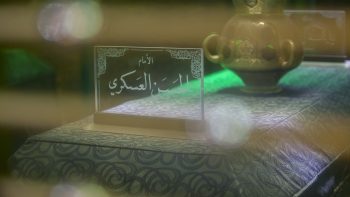
4. Introducing the last imam to certain Shiites
Some of the special Shiites of Imam Askari (a.s.) would come to the presence of Imam Askari (a.s.) with strict adherence to security issues. Imam (a.s.) who wanted to introduce his beloved son, Imam Mahdi (a.s.) to the Shiites, showed them that blessed existence and introduced him as his successor and the last proof of God. The precious companions who were blessed with such a success used to share this matter with other Shiites with caution and even described the external characteristics of the luminous face of the Imam of the Time – Arwahna Leh al-Fida. Now, such traditions have been remembered for us as well.
Imam Askari (AS) took another step to introduce his son. That Imam, hiding from the government, wrote a letter to his lawyer in Qom and gave him the good news of the birth of God’s last proof so that the Shiites would be aware of this matter.
5. Shutting down ideological seditions
Imam Hasan Askari (a.s.) during his short Imamate and despite the many pressures of the Abbasids, as far as possible, did not stop enlightening the Ummah and protecting the Ummah from going astray. From the time of Harun Abbasi, the movement of translation in the Islamic society began, and this movement peaked during the era of Ma’mun and continued like this.
In this movement, books in various scientific fields were translated from foreign languages and civilizations and distributed among Muslims. Some Muslims who had deprived themselves of the blessing of the Ahl al-Bayt (AS), because they did not have a rich content and a solid support, were influenced by these sciences and had become weak or disbelieving in the sacred things, and this especially happened with the arrival of Greek philosophy. found more
Arabic philosopher Kennedy’s forms to the Qur’an
One of the great scientific figures of that era is Yaqub bin Ishaq Kennedy, who is called the father of philosophy in the Islamic era and the philosopher of the Arabs. He, who was heavily influenced by deviant thoughts, thought that the Qur’an had contradictory verses; Therefore, he devoted some time to collecting what he thought were the contradictions of the Qur’an. Imam Hasan Askari (AS) learned about this story through one of his students. He guided Kennedy’s disciple in a very clever way to put an end to this sedition.
The Holy Prophet said to him: “Go to him and try to be friendly with him and help him on his way. When there is friendship between you, tell him: I have a question on my mind and I am asking you about it. He also wants you to ask your question. Then say to him: Suppose the one who recited this Qur’an comes to you [و با تو سخن گوید] Do you suppose that his words mean something other than what you have understood?
Then he says that such a possibility is possible; Because Kennedy is a man who understands what he hears very well. When he makes such a confession, tell him: So maybe the author of this Qur’an intended a meaning other than what you thought. [و معنای مورد نظر او با کلمات دیگرش تناقضی ندارد] In this case, you have put his speech in a different meaning than its true meaning with the idea you have made of his speech.
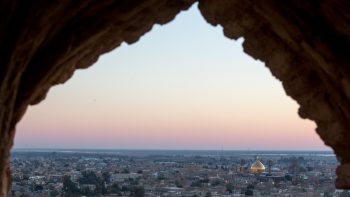
Kennedy’s student conveyed the Imam’s message
Kennedy’s student acted according to Imam’s advice and conveyed his words to him. After hearing this word, Kennedy fell into deep thought and considered this thought to be logically and logically possible and permissible. Then he said to his student: “I swear to you, tell me where you learned this word from?”. “It was something that came to my mind,” he replied. “Never!” said Kennedy. No one like you can say such a thoughtful speech.
It was here that Kennedy’s student disclosed the matter and said that Imam Askari (AS) taught him this word. “Yes,” said Kennedy; Such a word should not come out except from such a verse. Then he threw what he had written into the fire. 2 In this way, Imam (a.s.) prevented him from writing a book that could mislead many people throughout the generations, even though he was under confinement.
The story of the drought and the prayer of the Christian monk
Another event that threatened the beliefs of Muslims and was neutralized by Imam Hassan Askari (a.s.) is related to the drought in that era. It had not rained for a long time and the people were in dire straits. No matter how the government agents prayed the Istiqa prayer, there was no news, until a group of Christians gathered and went to the desert. Among them was an old monk who started to pray, the sky started to rain. This issue was repeated the next day and when that monk began to pray, it started raining twice. It reached a point where many Muslims doubted the authenticity of Islam and turned to Christianity.
At this time, Imam (a.s.) was in the prison of the Abbasid caliph. He brought Imam Hasan Askari (a.s.) out of prison and asked him to find the ummah of the ancestors of the Messenger of Allah, who perished. On the third day when the Christians came out to pray, Imam Askari (AS) also came to that place with some of his companions. As soon as he looked at the monk who raised his hand to pray, he told one of his slaves to take his right hand and take out what was between his fingers.
That slave removed a bone from his hand. Imam (a.s.) took that piece of bone and said to that monk: “Now ask for rain!” But this time, things went differently and people saw that the sky filled with clouds suddenly became clear and sunny.
Caliph asked the Imam (AS): “What is this bone?” He said: “This man passed by the grave of one of the prophets and got this bone from there [قانون الهی بر این است که] The bone of a prophet will never appear, unless it rains.” 3 In this way, with the guidance of Imam Hassan Askari (a.s.), the sedition that could lead Muslims to leave the religion and lead them to Christianity was destroyed.
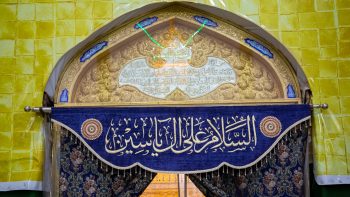
6. The expansion of the Shiite school
Even though since the time of Imam Kazim (a.s.) the infallible imams, especially Imam Hadi and Imam Hasan Askari (a.s.) were under strict supervision, the school of Ahl al-Bayt (a.s.) was expanding rapidly in the Islamic world. According to some reports, at that time, Shiites had spread in important cities such as Baghdad, Egypt, Yemen, Medina, Mada’in (the former capital of Sassanid Iran) and other parts of today’s Iran.
Even some of them had reached Samarra and were present in the capital of Bani Abbas, and they used to come to the house of Imam Hadi and Imam Askari (a.s.) in the guise of oil seller and vegetable seller and communicate with them. They would ask questions and get their answers, and sometimes they would put people’s letters or letters in oil containers and deliver them to those dignitaries, or they would get their answers and take them to the Shiites.
One of the servants of Imam Askari (a.s.), who used to heat the bath for him, narrates that one day Imam (a.s.) gave me a piece of wood that was stuck to the heel of the door and told me to deliver it to someone in a certain place. He says: “I set off and on the way I came to Saqqee, who is riding a mule, blocking the way for me. I said to him: Move this mule and hit the mule with that stick to move. “Suddenly, I saw that the wood was separated and letters fell out of it.” This story shows the circumstances under which the Imam (a.s.) delivered his message to the Shiites.
Imamate period of Imam Hasan Askari (AS)
Imam Hasan Askari (a.s.) served as Imam for only six years, which is the shortest period of Imamate among the Imams of Athar (a.s.).
Footnotes:
Abu Jaafar, Muhammad bin Ali (a.s.) is the noble and dignified son of Imam Hadi (a.s.), who was older than his brother Imam Hassan (a.s.) in terms of age. He died during his father’s lifetime in the city of Balad near Samarra. Right now, his sacred court in Balad is the focus of Shiites and fans of Ahl al-Bayt (AS).
Manaqib Al Abi Talib, vol. 4, p. 424.
Bihar al-Anwar, vol. 50, pp. 270-271.
منبع: www.khabaronline.ir

